|
|
|
Sort Order |
|
|
|
Items / Page
|
|
|
|
|
|
|
| Srl | Item |
| 1 |
ID:
073382
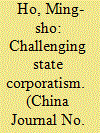

|
|
|
|
|
| Publication |
2006.
|
| Summary/Abstract |
This paper traces the post-authoritarian development of state-labor relations in Taiwan by focusing on the union federation movement (1994-2004). Since the late 1980s, Taiwan's labor movement has sought to challenge state-corporatist control, in the sense of representative monopoly by a conservative national federation. Owing to legal restrictions and the availability of support from the Opposition, Taiwan's labor movement opted for the strategy of political alignment rather than building organizational basis. Close cooperation with Opposition élites enabled the labor movement to bend the iron bars of state corporatism with a relatively weak organizational basis. With the legalization of the Taiwan Confederation of Trade Unions in 2000, industrial labor finally acquired an institutional position within the political system and was able to promote labor reforms. Nevertheless, the TCTU remained organizationally fragile, financially weak and faction-ridden as a result of the political alignment strategy. Consequently, the demise of state corporatism ended the labor federation movement, rather than ushering in a new era of societal corporatism.
|
|
|
|
|
|
|
|
|
|
|
|
|
|
|
|
| 2 |
ID:
184089
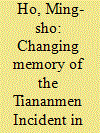

|
|
|
|
|
| Summary/Abstract |
This article examines the three-decade evolution of remembering the Tiananmen Incident in Taiwan by looking at annual commemorative activities. There is a decisive shift from a patriotic understanding to a cosmopolitan perspective grounded in universal values. The earlier memory was based on an ethnic nationalism that stressed consanguinity among Taiwanese and mainland Chinese and a narrative of the Chinese Republican Revolution. However, such framing lost its persuasiveness and the memory of Tiananmen faded as Taiwanese, particularly the younger generation, embraced an indigenous identity. China’s rapid economic growth and its ascendency as a new world power neutralized the potency of the earlier memory because it demonstrated the possibility of nationalistic aspirations without democracy. Since 2011, commemorative rallies have revived and proceeded with a newer understanding of the Tiananmen Incident in terms of human rights, civil society, and youth activism. This article argues that this ‘mnemonic change’ reflects Taiwan’s democratization and the indigenization of Taiwanese society, enabling young organizers to articulate their own Tiananmen memory by referencing global civil-society activism. Mnemonic change in Taiwan is examined with a comparative reference to the parallel development in Hong Kong.
|
|
|
|
|
|
|
|
|
|
|
|
|
|
|
|
| 3 |
ID:
175163
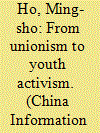

|
|
|
|
|
| Summary/Abstract |
This article examines two major protests related to working-hour reforms in Taiwan in 2000 and 2016–18, paying particular attention to the shift in the composition of protesters from union members to youth activists. The decline in mass membership and the failure to consolidate a national federation have diminished the political presence of labour unions. The emergence of youth protest movements, both before and after the 2014 Sunflower Movement, made possible the advent of Taiwan’s youth as political actors. The reconfiguration of Taiwan’s working hour politics has paralleled the global transition from the classical organization-based collective action to the digitally enabled ‘connective action’. The concluding section provides reflections on the impacts as well as the limitations of this newer form of labour politics.
|
|
|
|
|
|
|
|
|
|
|
|
|
|
|
|
| 4 |
ID:
189410
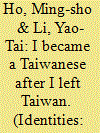

|
|
|
|
|
| Summary/Abstract |
Migration and transnationalism studies use variables such as migration trajectory, length of stay, and ties with origin country to examine migrant identities. Research has also found that contrary to the prediction of assimilation theory, some well-adapted migrants activate their origin country identities. Using young Taiwanese immigrants who stayed in Taiwan for most of their lives and went to the United States as a case, this article examines the mechanisms of context- and event-driven identity shift. We argue that these young adult Taiwanese immigrants – most of whom are first-generation – find that they are situated in a context where they have to ‘choose’ and ‘perform’ an identity for everyday interaction. Negative experiences with Chinese immigrants and the realization of Taiwan’s marginality encouraged them to activate their homeland (Taiwan) identity. This article contributes to migration and identity literature by analysing the consequences (identity triggers and shifts) of everyday encounters and events in an immigration setting.
|
|
|
|
|
|
|
|
|
|
|
|
|
|
|
|
| 5 |
ID:
134416


|
|
|
|
|
| Summary/Abstract |
Lee, Kingsyhon
China has witnessed several peaceful and successful anti-PX (para-xylene) protests in Xiamen, Dalian, and Ningbo in recent years. However, the protest in Maoming in 2014 turned out to be a noteworthy exception. By using participant observation and in-depth interview data, this article raises the following observations: first, in spite of official propaganda, Maoming citizens actually understand the environmental risk of PX production because of their personal experiences with existing pollution as well as from their knowledge of the Xiamen incident. Secondly, the Maoming protest proceeded in a less organised manner, which explains its violent tendencies. Finally, the large-scale protest was able to proceed without the support of mainstream media and the middle class due to the use of online social media and local knowledge of the urban terrain.
|
|
|
|
|
|
|
|
|
|
|
|
|
|
|
|
| 6 |
ID:
152270
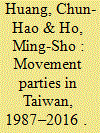

|
|
|
|
|
| Summary/Abstract |
This article examines the development of “movement parties” in Taiwan by applying the political opportunity perspective to understand how external conditions impacted their electoral path. We explain the rise and fall of movement parties by changes in electoral system, level of movement activism, and the permeability of the DPP.
|
|
|
|
|
|
|
|
|
|
|
|
|
|
|
|
| 7 |
ID:
137207
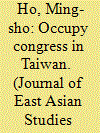

|
|
|
|
|
| Summary/Abstract |
In opposition to a free trade pact with China, Taiwan's Sunflower Movement erupted in spring 2014 and occupied the national legislature for twenty-four days. Drawing from the recent debates on the relation between social movements and the state, I elaborate a revised polity model that focuses on the effects of elite disunity, threat, and movement strategy. The Sunflower Movement originated from a tactical misstep by the ruling party that created an immediate sense of threat from proposed closer economic ties with China, thereby facilitating protest mobilization. Student protesters were able to seize the national legislature because of an internal split within the ruling party and support from the opposition party. However, the failure to further exploit these favorable opportunities exposed the movement to government repression. Fortunately for the movement, the disunity among elites helped the activists manage a dignified exit, which they could claim as a success.
|
|
|
|
|
|
|
|
|
|
|
|
|
|
|
|
| 8 |
ID:
134413
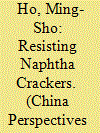

|
|
|
|
|
| Summary/Abstract |
Protests against naphtha crackers have been an important trend in Taiwan’s environmentalism since their emergence in the mid-1980s. This article analyses ten protest cases (1987-2011) to understand the evolution of environmental politics. I draw the following conclusions: (1) with the growing public awareness of pollution, new petrochemical projects are increasingly facing popular opposition; (2) the environmental movement assumes less partisanship, although ideological differences between the political parties still remains; (3) the mobilising capacity of NGOs is on the rise and has become the key factor in the success of protests.
|
|
|
|
|
|
|
|
|
|
|
|
|
|
|
|
| 9 |
ID:
076470
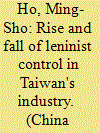

|
|
|
| 10 |
ID:
166877
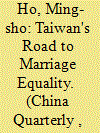

|
|
|
|
|
| Summary/Abstract |
In May 2017, Taiwan's Constitutional Court reached a landmark decision that marriage should be opened to same-sex couples within two years, making Taiwan potentially the first country in Asia to realize marriage equality. How can we explain the success of the LGBT movement here? I argue that explanations based on cultural proclivity, public opinion, and linkages to world society, are inadequate. This article adopts a “political process” explanation by looking at changes in the political context and how they facilitate the movement for marriage equality. I maintain that electoral system reform in 2008, the eruption of the Sunflower Movement in 2014, and the electoral victory of the Democratic Progressive Party in 2016, stimulated Taiwan's LGBT mobilization, allowing it to eventually overcome opposition from the church-based countermovement.
|
|
|
|
|
|
|
|
|
|
|
|
|
|
|
|
| 11 |
ID:
066719
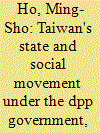

|
|
|
| 12 |
ID:
101309
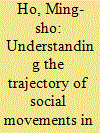

|
|
|
| 13 |
ID:
061509
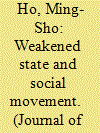

|
|
|
| 14 |
ID:
170373
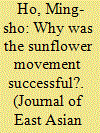

|
|
|
|
|
|
|
|